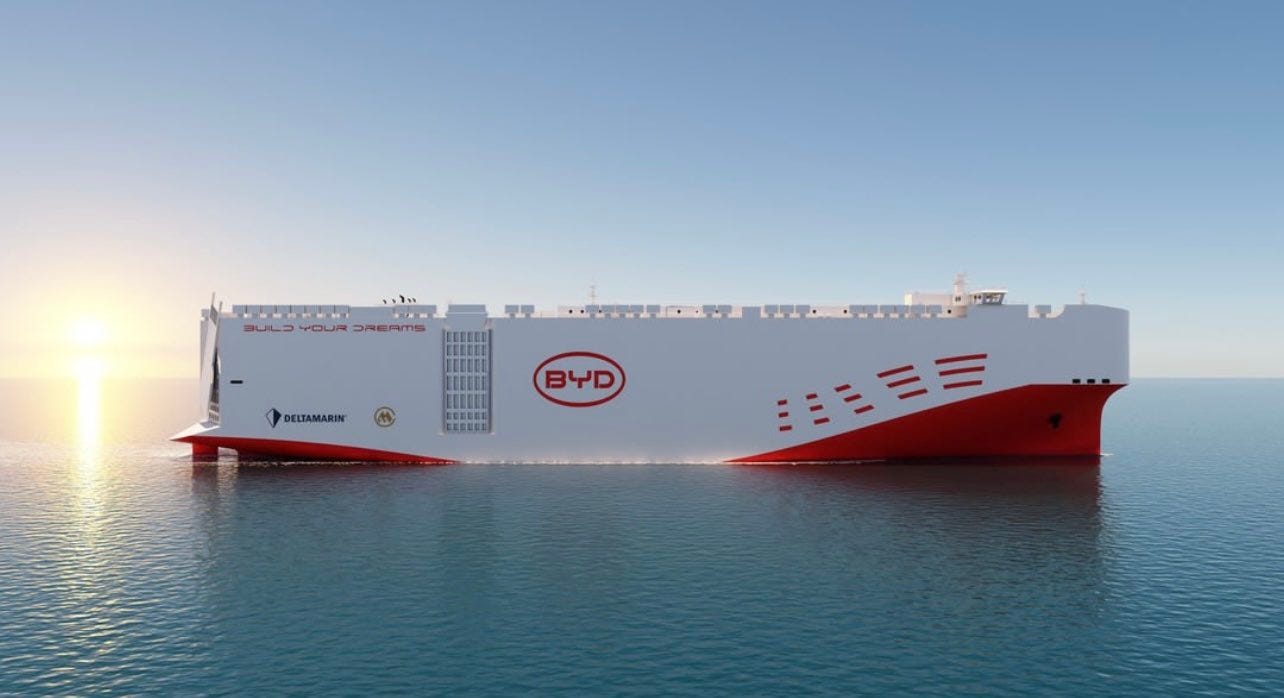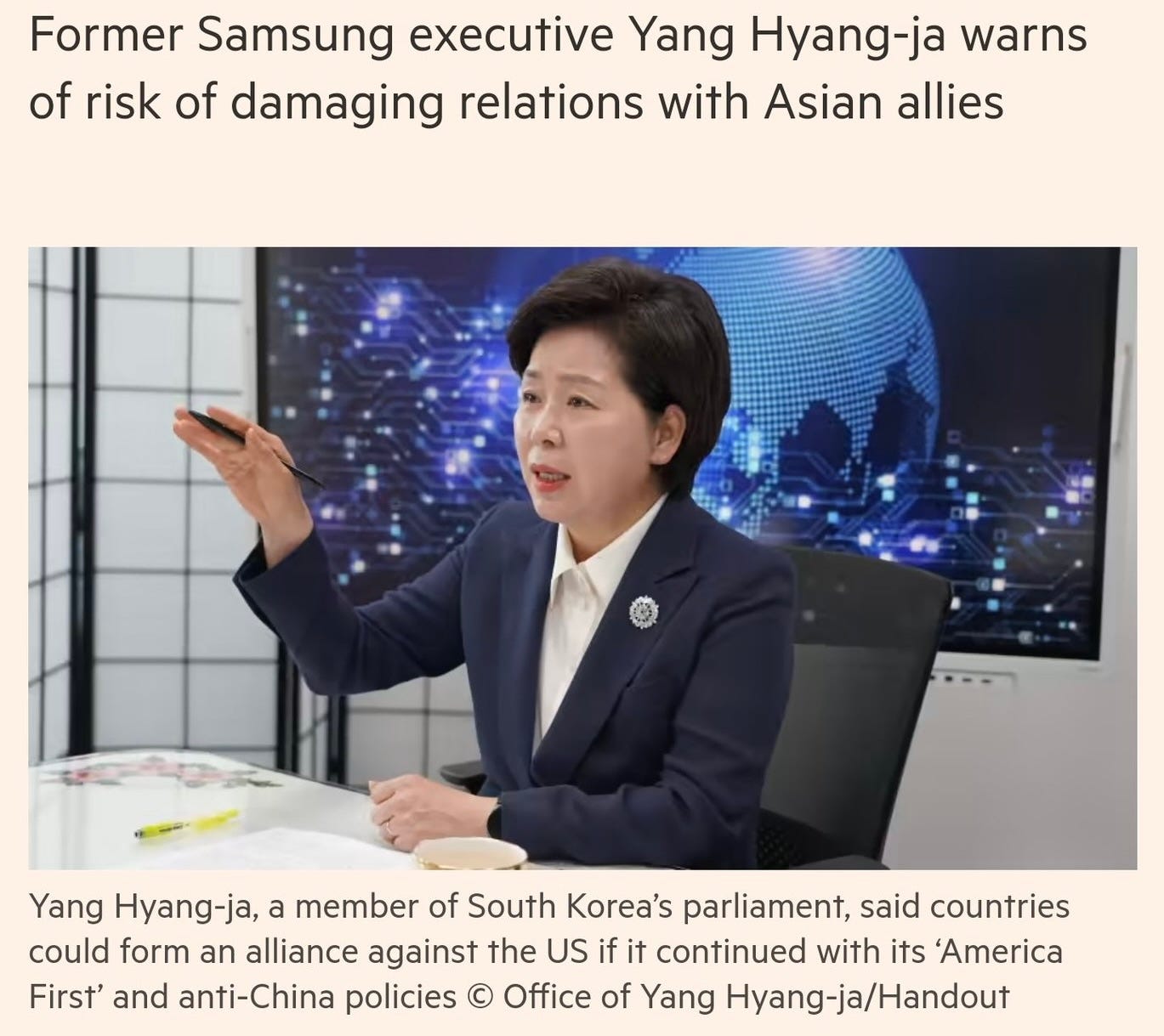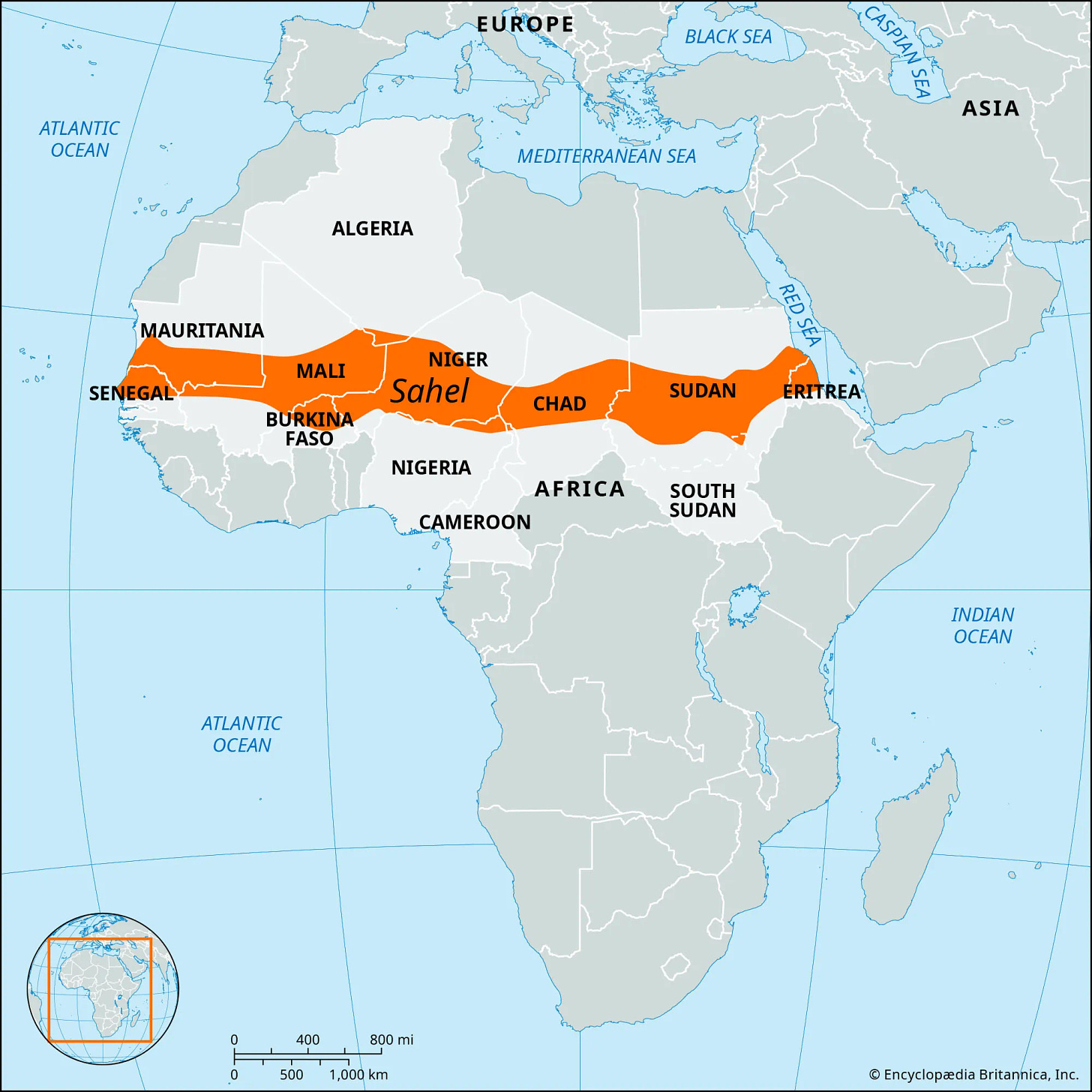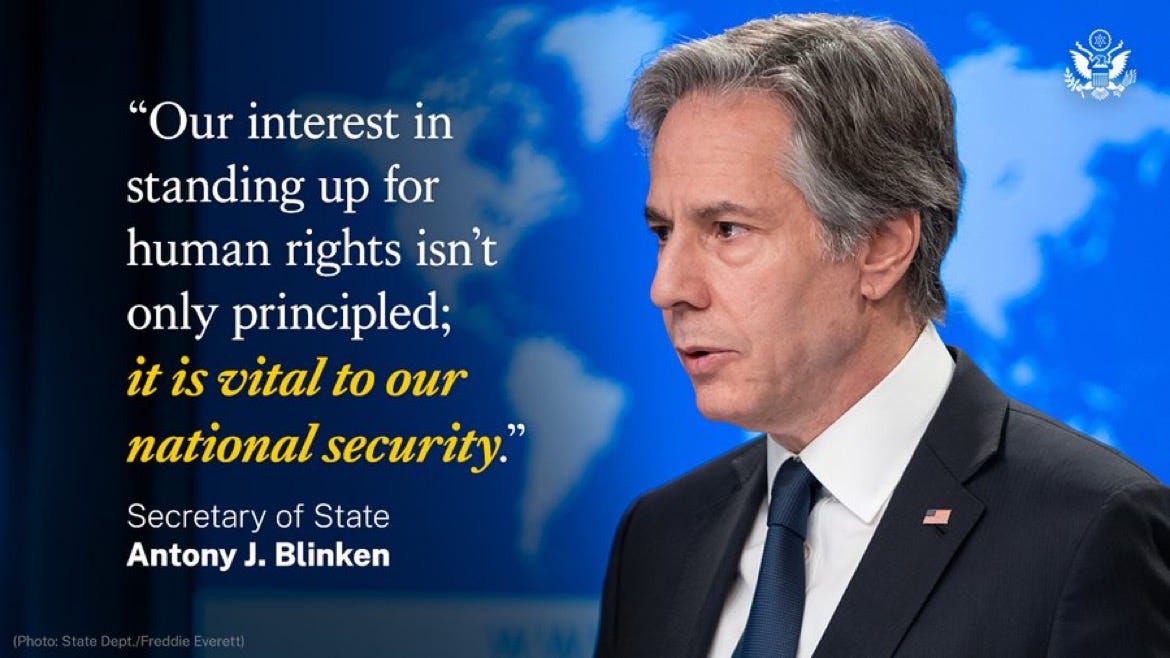Great Divide
China EV's dominate -UK repeats spy slur, Korean influencer warns US on chips, Niger may unleash proxy wars across Sahel, USA has launched 251 military interventions between 1991-2022
UPDATE: Sales of China-produced new-energy vehicles (NEVs) reached 3.65 million in the first half of 2023, up 48 percent year-on-year and accounting for more than 60 percent of the global NEV market.
Former Samsung executive and influential South Korean legislator Yang Hyang-ja has strongly criticised Washington’s interventions in the global semiconductor industry, in a sign of the disquiet in Seoul over US efforts to corral Asian allies into its economic security agenda.
Niger is quickly becoming a new flashpoint in great power competition as ECOWAS mulls military intervention in the wake of the coup in Niger.
The United States launched at least 251 military interventions between 1991 and 2022. This is according to a report by the Congressional Research Service, a US government institution that compiles information on behalf of Congress.
China EV’s 60% global share
By Global Times
Sales of China-produced new-energy vehicles (NEVs) reached 3.65 million in the first half of 2023, up 48 percent year-on-year and accounting for more than 60 percent of the global NEV market.
Experts said that the strong momentum will persist for the rest of the year, and China may become the largest exporter of all types of vehicles and surpass Japan by the end of 2023, as China's auto manufacturing gets a boost from NEV making.
First-half global NEV sales grew by 45 percent year-on-year to 6.05 million, amid the expiration of government subsidies in various countries, said Cui Dongshu, secretary general of the China Passenger Car Association (CPCA), on Saturday.
"Thanks to an advanced industrial supply chain, China-produced NEVs made remarkable achievements in the first half of 2023, helping lift sales in both domestic and overseas markets," said Cui.
The structure of the global auto market remains stable, and the strong growth momentum of China's auto exports will be extended to the end of 2023, Cui said.
China overtook Japan as the world's top auto export in the first quarter of 2023.
Data from China's General Administration of Customs showed that China exported 1.07 million vehicles in the first quarter, while Japan exported 950,000 vehicles, according to the Japan Automobile Manufacturers Association.
"Based on the current situation in China's auto industry, the nation's annual auto exports may surpass Japan's by the year-end," Wu Shuocheng, a veteran automobile analyst, told the Global Times on Sunday, noting that China now leads the global green energy transformation.
However, Cui commented that building stable trade relations with as many countries as possible are necessary to consolidate the achievements of China's auto exports.
According to the Politico, France is pushing the EU to hit back at alleged "unfair exports" of electric vehicles by some countries.
Amid possible headwinds, Wu suggested that Chinese auto brands should invest more in overseas markets by investing in manufacturing and strategic centres overseas to defuse risks caused by trade protectionism and exchange rate volatility.
Read more here.
South Korean politician urges US to abandon China chip strategy
Former Samsung executive and influential South Korean legislator Yang Hyang-ja has strongly criticised Washington’s interventions in the global semiconductor industry, in a sign of the disquiet in Seoul over US efforts to corral Asian allies into its economic security agenda.
Yang Hyang-ja, a former chip engineer and Samsung executive who chaired a ruling party committee on South Korea’s semiconductor competitiveness until early this year, said that measures to curb China’s ability to access or produce advanced chips risked damaging relations with its Asian allies.
“If [Washington] continues to try to punish other nations and to pass bills and implement ‘America First’ policies in an unpredictable manner, other countries could form an alliance against the US,” Yang told the Financial Times in an interview.
“The US is the strongest nation in the world,” she added. “It should consider more of humanity’s common values. Appearing to use its strength as a weapon is not desirable.”
The US has passed legislation offering tens of billions of dollars in subsidies to non-Chinese chipmakers to increase semiconductor production in the US, in exchange for restrictions on their ability to upgrade or expand their facilities in China.
The Biden administration has also imposed sweeping export controls on critical chip manufacturing tools to China and prohibited US nationals and companies from offering direct or indirect support to Chinese companies involved in advanced chip manufacturing.
But there are concerns in Seoul that the US measures will provoke a backlash from Beijing, disrupting finely calibrated supply chains and threatening profits.
Lee Jae-myung, the leader of South Korea’s leftwing opposition Democratic party, has accused the conservative government of harming the country’s economic and security interests by siding too closely with the US and Japan against China and Russia.
Yang, a former Democratic party member who formed her own technocratic party, Hope of Korea, in June, acknowledged that “US tech war measures are not harming our semiconductor industry yet because sanctions against China could actually reduce output, leading to higher prices”.
But she added: “The more the US sanctions China, the harder China will try to make rapid technological progress. China will provide more national support for the goal. Then it will pose a crisis to South Korea, given China’s abundant talent and raw materials.”
“The US should abandon its current approach of trying to get something out of shaking and breaking the global value chain,” she said.
Yang added that the US had benefited from South Korean and Taiwanese expertise in manufacturing memory and processor chips respectively, saying it was “trying to demolish the status quo through sanctions”.
Many analysts said the US measures actually helped South Korean chipmakers by hampering the progress of their Chinese competitors.
The biggest long-term threat to South Korea’s semiconductor industry, they said, was not supply chain disruption but the rise of state-backed Chinese rivals such as YMTC, which has made rapid progress in closing the technological gap with leading Korean chipmakers in the Nand flash-memory sector.
Troy Stangarone, senior director at the Korea Economic Institute of America, notes that US tech giant Apple had considered using YMTC’s Nand flash-memory chips for the current iPhone 14, until political pressure from US lawmakers forced it to abandon the option.
“The Apple-YMTC episode demonstrated both how far the Chinese have come in the Nand memory sector, and how Korean companies have benefited from US intervention,” said Stangarone.
The FT has also reported that US export controls helped thwart an alleged attempt by a renowned South Korean semiconductor expert to build a “copycat” memory chip plant in China. According to Korean prosecutors, the plant “would have caused irrecoverable losses to the [Korean] semiconductor industry”.
Yang accepted that the US-China tech war had bought South Korea time to develop its own technologies but added that the country’s semiconductor industry was in a “very precarious situation”.
The lawmaker, who was instrumental in passing the K-Chips Act this year to boost tax credits for companies investing in chip manufacturing in South Korea, said the country had to address what she described as neglect of its own engineering talent.
“In Taiwan, technicians get treated better than lawyers and judges. But in Korea, they are not treated well,” said Yang, who is also a member of a cross-party committee on cutting-edge technologies.
“Smart Korean students want to become doctors, dentists or oriental medicine practitioners rather than to become engineers,” she said. “Only technology can set us free from all these geopolitical problems.”
Read more here.
Is Niger crisis a proxy war in West Africa
By Ovigwe Eguegu
Niger is quickly becoming a new flashpoint in great power competition as ECOWAS mulls military intervention in the wake of the coup in Niger.
Last Wednesday, the world was greeted with the news of a military takeover in Niger. Expectedly, the Economic Community of West African States (ECOWAS) sanctioned and suspended Niger from the bloc. The grouping went further and threatened a military intervention if President Mohamed Bazoum is not reinstated within a week.
Similarly, the United States (US), France, and the European Union (EU) wasted no time in condemning the coup. The reaction to the coup from within and outside the region is strongest compared to other recent coups, and the reasons are not far-fetched.
Niger is a cornerstone of the Sahel Strategies of the US, France, and the European Union. Exports of uranium from Niger are vital for French and European nuclear energy operations. So, it came as no surprise when France also threatened action against the Junta if they harm “French interests” in the country.
While there is precedent for ECOWAS threat and use of military intervention, the equation changed when in solidarity with Niger, Burkina Faso and Mali released a joint statement condemning the possibility of military intervention, stating plainly that “all military intervention against Niger will be considered equivalent to a declaration of war against Burkina Faso and Mali”.
This game-changing declaration means the use of force against the putschists in Niger would push West Africa into a conventional war, one that will quickly become a new flashpoint in great power competition with devasting consequences for the region.
Just as in Mali, Burkina Faso, and Guinea, the reasons Junta in Niger cited for their actions included chronic insecurity, poor economic conditions, and misrule.
Russia, France, and the wave of populist coups
The overthrow of President Mohamed Bazoum was the sixth successful coup in West Africa since 2020. General Abdourahamane Tiani who headed the presidential guard was later declared as head of state. On the surface, these coups are ambitious power grabs by disgruntled officers interrupting Africa’s democratisation process. Just as in Mali, Burkina Faso, and Guinea, the reasons Junta in Niger cited for their actions included chronic insecurity, poor economic conditions, and misrule. These reasons are not without merit. Maybe except for Guinea, there is a strong anti–neocolonial sentiment held by both citizens and the populations of these countries.
Niger is one of the poorest countries in the world, and like Mali and Burkina Faso, is consistently at the bottom of the Human Development Index. Citizens of these countries blame neocolonial economic policies and structures for their economic woes, while experts blame the chronic underdevelopment in this region for the security challenges such as terrorism, human trafficking, and other security problems.
According to the World Bank, Niger has been faced with an influx of displaced persons from Nigeria and Mali, and as of 2022, there were almost 295,000 refugees with roughly 350,000 displaced persons overall in the country. As of 2021, studies suggest that over 41.8 percent of Niger’s population is living in extreme poverty, and while there was a GDP growth of 1.4 percent in 2021, projections show that new economic programs are expected to boost GDP per-capita by 15 percent in the next year. Furthermore, irrigation programmes and a good rainy season increased agricultural production by 27 percent, a big boost considering agriculture alone accounts for 40 percent of the country’s GDP.
Niger has been faced with an influx of displaced persons from Nigeria and Mali, and as of 2022, there were almost 295,000 refugees with roughly 350,000 displaced persons overall in the country.
France has led regional security efforts for most of the last decade. Aside from setting up the G5-Sahel Force, Paris deployed over 5,000 troops under Operation Barkhane, the UN’s MINUSMA had a 15,000-troop presence while the EU had special forces deployed under Operation Takuba. Under these security programmes, terrorism and violence in the region only increased. When Ibrahim Traore ceased power in Burkina Faso in September 2022, 40 percent of the country’s territory had come under the control of jihadists leading France and its European allies to lose credibility as security providers in the region.
UN and French-led security programs have often failed with mainstream media often downplaying this while simultaneously exaggerating Russia’s growing influence in the region. While there is evidence of Russian actors exploiting anti-western sentiments, these exist because of poor governance, foreign meddling, and developmental challenges.
Military cooperation between Mali and France has also deteriorated since the coup. In April last year, Mali expelled French troops ending Operation Barkhane after nine years of operations. In January 2023, Burkina Faso ended a 2018 military agreement with France and demanded the expulsion of French forces operating in the country. In both instances, the expulsion of French forces was celebrated by citizens who are often seen waving Russian flags alongside their own national flags.
UN and French-led security programs have often failed with mainstream media often downplaying this while simultaneously exaggerating Russia’s growing influence in the region.
The coups in Mali and Burkina Faso saw Niger becoming one of the main partners of France, the US, and the EU in the region. French and EU personnel were redeployed from Mali and Burkina Faso to Niger, which is also home to a French base and at least two US airbases making it the main platform for France, AFRICOM, and the EU operations in the region. This is a security arrangement that the recent coup is going to disrupt.
The Junta has revoked two military cooperation agreements with France, one dating back to 1977 and the second was signed in 2020. Niger holds more importance to France and Europe beyond security in West Africa. For perspective, over 50 percent of Nigerien uranium ore goes to France’s nuclear energy system, and 24 percent of uranium imports to the EU come from Niger. With the threat of a military leadership pivoting from France, Paris and Western allies are sure to deliberate action and support any means to restore Bazoum, thereby securing their access to key energy resources for Europe.
ECOWAS mulls intervention
While plans of intervention are been discussed by ECOWAS officials in Abuja, Nigeria, a delegation of officials arrived in Niamey on 3 August as part of mediation efforts. However, the delegation did not spend the night as planned, nor did it meet with coup leader Abdourahamane Tiani or deposed President Mohamed Bazoum; a sign that talks did not go as planned.
On that same Thursday, Senegal confirmed its troops will join any ECOWAS intervention in Niger. While the Niger’s Junta said; “any aggression or attempted aggression against the Niger will see an immediate and unannounced response from the Niger Defence and Security Forces on one of (the bloc’s) members, with the exception of suspended friendly countries.”
An ECOWAS military intervention is the worst thing that could take place in the region considering the existing security conditions. While Nigeria may contribute the highest number of troops to an ECOWAS military outfit, the country is not in a condition to conduct a war involving multiple countries. Furthermore, mass displacement and high mortality and migration will surely follow. With numerous internal challenges, economic, developmental, and humanitarian, facing the Sahel region, triggering a conflict between weak and fragile states amounts to self-destruction.
A better approach is for ECOWAS to enact deeper sanctions while doubling down on a diplomatic solution. In addition to the termination of existing financial aid packages, Niger could be on the receiving end of heavier sanctions that could be targeted towards financial ecosystems, transport, or other critical economic sectors. ECOWAS countries have enormous leverage vis-à-vis Niger.
For Instance, Nigeria supplies 70 percent of Niger’s electricity, and taken together Senegal and Cote Ivoire supply 40 percent of Niger’s refined petroleum. Commitments will also be tested under a sanctions-heavy environment. However, it is important to factor in the will of the Nigerien people, some of whom have expressed vocal support for the junta.
With numerous internal challenges, economic, developmental, and humanitarian, facing the Sahel region, triggering a conflict between weak and fragile states amounts to self-destruction.
In all, the coup in Niger is one coup too many for the region, but with regional security and geopolitical dynamics, it important to access the rationale of an ECOWAS military intervention. On a wider geopolitical front, multipolarity and elements of alignment and non-alignment are emerging faster than ever, and traditional relations are being tested, terminated, or renegotiated. The so-called great power competition is in full swing and African countries are moving away from being passive, occupying a proactive role whether or not it follows an ‘established decorum’.
One week after the coup, the Junta is making attempts to consolidate its grip on power. It has announced the reopening of borders with five neighbours, appointed new governors to the countries five regions, and says the country is on a transition towards democracy. However, no timelines were given. This should be seen from a pragmatists lens as well considering the plausibility of an outright economic collapse. With these developments, it must be noted that military conflict will only affect vulnerable populations and further destabilise the region. An outcome that Africans do not wish for.
Read more here.
US launched 251 military interventions since 1991, and 469 since 1798
By Ben Norton
The United States launched at least 251 military interventions between 1991 and 2022. This is according to a report by the Congressional Research Service, a US government institution that compiles information on behalf of Congress. The report documented another 218 US military interventions between 1798 and 1990. That makes for a total of 469 US military interventions since 1798 that have been acknowledged by the Congress.
This data was published on March 8, 2022 by the Congressional Research Service (CRS), in a document titled “Instances of Use of United States Armed Forces Abroad, 1798-2022.”
The list of countries targeted by the US military includes the vast majority of the nations on Earth, including almost every single country in Latin America and the Caribbean and most of the African continent.
From the beginning of 1991 to the beginning of 2004, the US military launched 100 interventions, according to CRS.
That number grew to 200 military interventions between 1991 and 2018.
The report shows that, since the end of the first cold war in 1991, at the moment of US unipolar hegemony, the number of Washington’s military interventions abroad substantially increased.
Of the total 469 documented foreign military interventions, the Congressional Research Service noted that the US government only formally declared war 11 times, in just five separate wars.
The data exclude the independence war been US settlers and the British empire, any military deployments between 1776 and 1798, and the US Civil War.
It is important to stress that all of these numbers are conservative estimates, because they do not include US special operations, covert actions, or domestic deployments.
The CRS report clarified:
The list does not include covert actions or numerous occurrences in which U.S. forces have been stationed abroad since World War II in occupation forces or for participation in mutual security organizations, base agreements, or routine military assistance or training operations.
The report likewise excludes the deployment of the US military forces against Indigenous peoples, when they were systematically ethnically cleansed in the violent process of westward settler-colonial expansion.
CRS acknowledged that it left out the “continual use of U.S. military units in the exploration, settlement, and pacification of the western part of the United States.”
The Military Intervention Project at Tufts University’s Center for Strategic Studies has documented even more foreign meddling.
“The US has undertaken over 500 international military interventions since 1776, with nearly 60% undertaken between 1950 and 2017,” the project wrote. “What’s more, over one-third of these missions occurred after 1999.”
The Military Intervention Project added: “With the end of the Cold War era, we would expect the US to decrease its military interventions abroad, assuming lower threats and interests at stake. But these patterns reveal the opposite – the US has increased its military involvements abroad.”
Read more here.
Watch YouTube video here.








